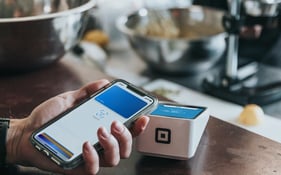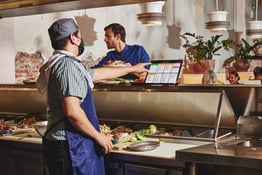Updated July 10, 2025
Einat Admony isn’t new to the industry. The Israeli chef and restaurateur is the founder of the popular falafel chain Taïm and owner of New York City-based Balaboosta. She is also an award-winning cookbook author, a two-time champion of Food Network’s Chopped, and a 2022 James Beard semifinalist.
And yet, Admony tells us that her most profitable venture is none of these, but her involvement with meal subscription platform CookUnity. The star chef joined CookUnity in 2021. It only took two years before she was selling thousands of meals a week on the chef-to-customer meal subscription platform.
CookUnity was a game-changer for Admony, and she isn't alone.
“The platform changed life for a lot of colleagues and chefs, including myself,” says Admony. “I’ve had many, many restaurants in my life. There’s no restaurant I’ve ever worked at that could make this kind of revenue.”
What Is CookUnity?
Admony is one of more than 100 chefs partnering with CookUnity. The restaurant subscription platform is designed to bring restaurant-quality meals directly to people’s doorsteps. This creates additional revenue for chefs and gives consumers access to chef-prepared meal subscription plans for home delivery.
Not only that, but CookUnity handles nearly every aspect of pre- and post-production, from providing kitchens and equipment to stocking ingredients to sealing, labeling, and shipping meals. This is an amazing benefit for chefs.
“You don’t need to deal with rent, equipment, insurance, a million different things,” says Admony. “I get to do what I love the most – creating food.”
How CookUnity Works
Born out of a single kitchen in Brooklyn in 2015, CookUnity now has facilities in major metropolitan areas including Los Angeles, Chicago, and Miami. The meal subscription platform has the geographic reach to serve roughly 98% of the U.S. population.
Since its inception, CookUnity has boasted celebrity chefs like Michelin-star Ludovic Lefebvre, Mŏkbar’s Esther Choi, and James Beard winner JJ Johnson. But with more than 100 chefs on its roster — including catering business operators, private chefs, and rising stars — CookUnity’s cooks come from an extremely wide range of backgrounds.
“It really comes down to the cuisine needs that we have per market,” says David Elkins, CookUnity's director of chef and menu success. “We give preference to potential partners who do have a social media presence, but that’s far from a requirement.”
Who Can Apply?
Any chef can apply. Applicants submit meal concepts, participate in an introductory phone call, and provide a live tasting. If the chef proves a good fit, CookUnity will present an offer.
Once contracts are signed, chefs are generally onboarded within 60 days. Chefs work with CookUnity during this onboarding period to develop a menu.
“We consider chefs as our business partners. From day one, it’s a collaborative endeavor,” says Elkins. “Our portfolio team is tasked with taking a look at customer behaviors and trends, and distilling that into actionable cases for chefs to design their menus around.”
How CookUnity Chefs Work
CookUnity facilities are a lot like ghost kitchens, which are basically restaurant operations designed entirely for delivery and takeout. In short – it’s like having a back of house without a front of house.
CookUnity has facilities throughout the U.S., including kitchens in Austin, Chicago, and Atlanta. Most CookUnity chefs and partners have dedicated, full-time teams who cook during all five production days. Some partners bring on lead chefs to manage teams across multiple CookUnity locations.
How CookUnity Keeps Up With Demand
CookUnity brings in business. That’s pretty clear. But how can chefs keep up with the demand? Elkins explains that “We work from a quantity available system – on each production day, we assign a maximum quantity [of meals].”
Elkins says that “Most chefs starting out have a menu of roughly three to four menu items at 50 quantity each, so you’re looking at 150 to 200 meals per day.”
Sales close 48 hours prior to production so that chefs know the exact number of portions needed in advance. All inventory and ingredient stocking is handled by CookUnity. This gives chefs the freedom to get cooking as soon as they show up. Dishwashing facilities and equipment maintenance is also offered, and CookUnity team members handle post-production tasks, like quality assurance, container sealing, labeling, and shipping.
Adjusting to the CookUnity Model
While CookUnity provides a notable level of support, the production experience is a lot different from traditional restaurant meal prep.
“Chef teams are often cooking anywhere from 500 to 2,500 meals in a single day, so having experience with large volume technique is super important,” says Elkins. “At a national level, the average weekly volume per chef team is 1,300 meals, but we have some chefs doing as high as 8,000 meals per week, and we have a couple of chef partners operating in all seven markets doing upwards of 20,000 meals per week.”


Subscribe to Our Monthly Operations Newsletter
Learn how to streamline your processes, cut costs, and run a more efficient restaurant.
The environment is also distinctly different from a restaurant. Chefs get to work among other talented colleagues, but they don't enjoy the dynamic of engaging with customers.
Admony says that at first, she missed that restaurant energy. But it didn’t take long before she was sold on the concept. “By three months in, I said, ‘I completely get it’,” she recalls. “There’s a simplicity in that the chef doesn’t have to deal with the purveyors and so many different layers and conflicts within restaurants. You’re in charge of payroll and creating an amazing team. That’s it.”
How CookUnity Chefs Get Paid
On the consumer side, CookUnity subscribers choose from meal plans containing 4 to 16 meals per week. Meal prices vary depending on the size of the meal plan. CookUnity chef partners get paid on commission at a rate that’s tied to meal performance on the platform.
“The higher a meal is rated by customers, the more commission a chef will get,” says Elkins. “Our customers can rate meals on a one to five system, and right now we offer [commissions of] $1.50 to $3 per meal.”
As of 2023, the average CookUnity partner was earning potential between $1,950 and $3,900 a week, based on roughly 1,300 meals sold. Chefs can monitor daily sales numbers, customer ratings, and reviews on an in-house app.
CookUnity also has a dedicated marketing team that works directly with every chef and will help partners launch social campaigns like announcing new menu features.
Taking Initiative
The chefs that do best on the meal subscription platform are typically also engaging in their own marketing efforts.
“I do a lot of research,” says Admony. “We heavily analyze what dishes people are looking for and what they’re actually ordering.”
So before you make the leap into the meal subscription space, make sure you crunch the numbers first. Not sure where to start? Check in for your personalized consultation and find out if you’re ready to partner with a meal subscription platform.





